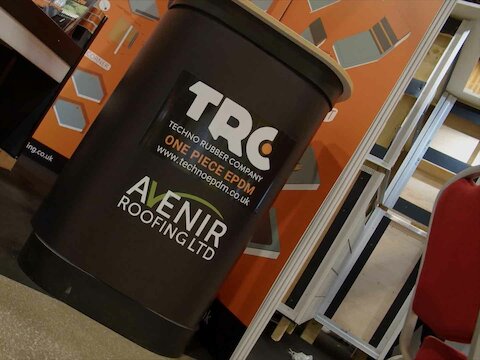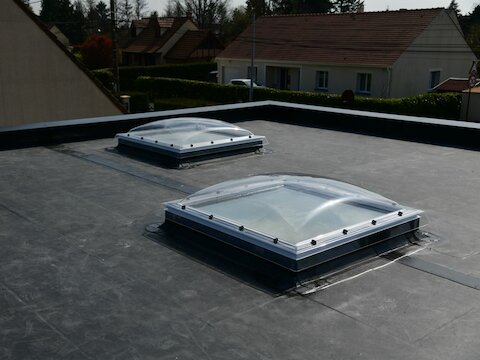Flat Roofing vs Sloped Roofing

So it’s come down to this, a contest between flat roofing and sloped roofing. Who will reign supreme? Well, it may surprise you, as the answer is a lot more complicated than you think! In this blog post, we’ll be exploring the benefits and negatives of each roofing type, as we work to find out which one rules the roof.
First Things First – What Are They?
First off, we’ll start with what they are. You may have seen flat roofing on garages or commercial buildings. It’s also commonly used on large buildings too. Flat roofing is not the most attractive roof out there, but it gets the job done, which makes it a great choice for commercial areas of all shapes and sizes. This roofing type is often made from PVC, EPDM, TPO, and Bitumen. It can also be made using Built-Up and Spray-On techniques.
Sloped roofing (also known as pitched roofing), is the traditional roofing option for domestic properties. Chances are, if you look at your property, you’ll see a well-maintained sloped roof staring back at you. (And if not, why not give our team a call?) The level of pitch differs depending on the property, but they generally provide an attractive appearance that suits homes of all shapes and sizes. They’re usually made of metal, tile or single-ply systems.
Flat Roofing
As previously mentioned, flat roofs are a popular option for commercial properties, so you may be eyeing one up for your business. It’s important to consider the advantages and disadvantages before you decide though, as they’re a large investment with massive implications for your property.
The Positives
Cost-Effective Roofing – The cost of your roof should be an immediate concern. Compared to other roofing types, flat roofing is cheap as chips! From the initial installation process to regular maintenance, you won’t be paying a premium for the materials that are needed.
Accessible – A flat surface makes everything easier. Whether you’re installing solar panels or repairing parts of your property, a flat roof allows for increased accessibility. You might be surprised to hear that a flat roof is not truly flat. They’re built on a slight angle to ensure that rainfall dissipates from the surface!
Save Space – Flat roofs allow you to save bundles of space. Take your conditioning units out of your premises and place them on your roof, or create a beautiful rooftop garden to augment your living space. A flat roof lets you utilise space that you didn’t know you had!
Expanded Interior Areas – Flat roofing doesn’t just apply to the exterior of your property. Because of the flat roof, you can better utilise your interior space. This makes it perfect for commercial properties that need to use every nook and cranny.
The Negatives
Drainage Issues – As previously mentioned, flat roofs are slightly sloped to allows for drainage, but they don’t do it as well as sloped roofs. This often leaves puddles or pools or water, which may damage the material if left unchecked.
Cheap Roofing Materials – This benefit is a double-edged sword. Flat roofing materials inexpensive and easy to install, but they tend to have a short lifespan. As a result, regular maintenance is often needed to maintain their quality.
Appearance – Let’s face it, you’re not going to get a second glance with flat roofing installed. This roofing option does what it does well, but it’s not a looker, and it’s usually overshadowed by the appearance of the property itself.
Sloped Roofing
When installed correctly, a sloped roof makes all the difference. An attractive roof is often the first thing people notice, but that doesn’t mean that there aren’t any downsides. View the positives and negatives below, and don’t hesitate to contact our team if you have any questions about either roofing choice.
The Advantages
Extended Life Span – The lifespan of your roof should be taken into consideration before your purchase. You’ll be happy to hear that sloped roofing has a longer lifespan than other roof types, which is reflected in its cost.
Increased Loft Space – Due to the pitch of a sloped roof, you can make use of increased loft space. If you’re planning to settle down, your family will be able to expand into a comfortable living area!
Dependable Drainage – From thunderous rainfall to unexpected snowfall, a pitched roof handles all weather conditions. When combined with a state-of-the-art guttering system, your property is sure to benefit.
Appearance is Everything – Whether you want to blend in or stand out, a pitched roof augments the appearance of your property. It promotes a grand, attractive style which meets building requirements in locations across the country.
The Disadvantages
Structural Safety – Converting a flat roof to a sloped roof results in a range of problems, as a sloped roof places stress on the foundations of your premises. This makes sloped roofing unavailable on a range of properties.
The Cost – Benefits often come with consequences, and the durability of sloped roofing increases the cost of the roof. You may be paying a premium for the cost of a properly installed sloped roof.
Design Restrictions – You might have noticed that domestic properties have the same style of sloped roof, no matter where they are. This is due to design restrictions, as the pitch of the roof needs to reflect the structure of the property.
The Results Are In
All things considered, one question still remains. Which roof should you choose? The answer, which may not be surprising, is it depends.
Flat roofing is popular on commercial properties for a reason. It saves space, it’s incredibly cost-effective, and it’s easy to install and maintain. Yet it’s seen as unattractive, and it’s not as durable due to the drainage issues and materials used. On the other hand, sloped roofing is extremely durable and attractive, yet it can cost a lot of hard-earned money. The design choices are also limited because of structural issues.
The best thing to do is research your options and contact a professional team. Which is quite handy, because further details are available on our website. Our team are always happy to help with your queries, so give us a call if you need to discuss your property in detail.




